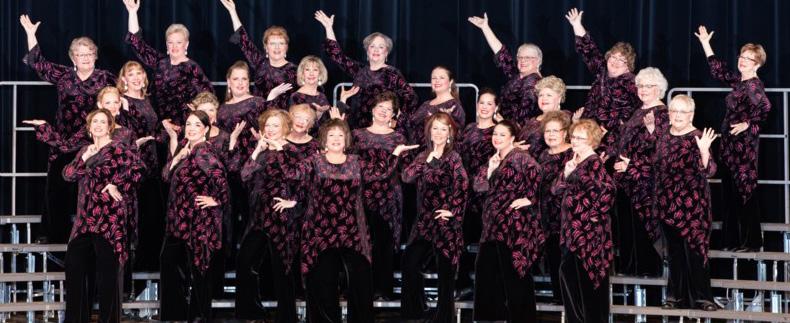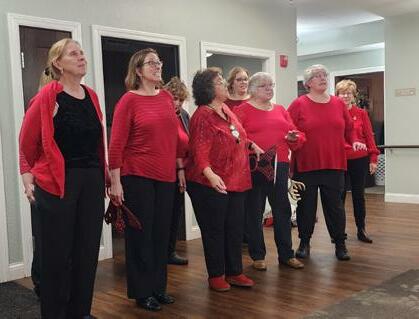
8 minute read
North Kato Spring 2023
BY NATE BOOTS
In 1945, Sweet Adelines International was first established in Oklahoma as an organization of women singers. The purpose was to promote and feature harmony-style singing and choral performance. Some thirty years later, the Kato area produced its own Sweet Adelines-chartered group that made its debut contest performance in 1975. Directed by Carol Grimmer, it was called the Minnesota Valley Chorus.
With various members coming and going, the chorus has now sung through nearly half a century, giving colorful performances and navigating through the recent pandemic to keep the music alive. Recently, North Kato mag conducted interviews with five different ladies connected with Minnesota Valley Chorus: Patti Dykema (current director), Mary Lou Kudela (a charter member), Lori Scott (management team lead coordinator), Lori Christiansen (management team secretary), and Melissa Sailor (public relations chair). Responses have been edited for content and space.
What drew you to singing in the Sweet Adelines?
Patty Dykema: Singing with my mom, who was one of the charter members of the chorus. It was a way to bond with my mother through our mutual love of singing.
Mary Lou Kudela: My aunt was a musician and organist, and with her five daughters and my mom and another aunt, we sang around the piano in the days before TV and iPods. I had sung in school and church choirs in New York, but when I moved to Mankato, I didn’t know where to find a singing
group. Then I heard from our first director, Carol Grimmer, that she was interested in starting a Sweet Adelines chorus. I was looking for friendship as well as singing, so I thought, “Hey, this is a way to get in on the ground floor!” So, I was her first recruit in 1973. As I look back on my 47 years of singing harmony, I can say it was and is one of my best decisions for an uplifting lifelong pursuit.

Lori Scott: I love singing harmony. Singing a cappella harmony (without any instruments) is the purest form of making harmony. Sweet Adelines is always a cappella with four-part harmony.
Lori Christiansen: I had experienced a cappella, four-part barbershop harmony while singing in a quartet in high school. Not only did I enjoy the sound of ringing chords, but I also liked singing to an audience. I attended college in Mankato, and once I heard there was a Sweet Adelines chorus here, I eagerly sought more information. Thirty-four years later, I’m still singing with the Minnesota Valley Chorus.
Melissa Sailor: I've wanted to be a Sweet Adeline since I was in fifth grade. Once my kids were grown enough to be left alone for a few hours, I joined the group.
What's one of the best things about being in the Sweet Adelines?
Lori Scott: We enjoy singing together at our weekly rehearsals. But it’s more than that. We also perform in many situations, including putting together entertaining shows, singing for Sunday morning services, holiday shows and caroling, annual judged competitions, public or community events, and teaching and encouraging youth about this art form. Sweet Adelines is a wonderful sisterhood. I started in 2006 in one town. Since then, I moved twice. Each time I moved, I joined a new, local chorus and was immediately embraced by a new circle of friends.
Patty Dykema: Singing together a cappella with three other people and knowing that chords will ring. Hearing the overtone when we're all singing correctly gives me goose bumps. Trust me, it is the coolest thing ever!
Lori Christiansen: One of the best things about singing in our chorus is the camaraderie with women of various ages, occupations, and stages of life. The common thread is our love for singing.
Melissa Sailor: I love harmony, and I love to sing. The part I love best about being a Sweet Adeline is when we have learned our songs and are about to perform in front of people.

Mary Lou Kudela: I love the diversity of music, talents, learning new skills, and meeting people in my own community as well as from around the world. For a while, I served as a Sweet Adelines International Faculty member who was invited to teach other choruses in the United States about topics such as presentation skills, building a management team, or how to emcee or write a script for staging a show. Not only did I travel, meet new people, and make new friends, I also learned much in my research and preparation of a topic. It was endlessly creative.
How has being in this group changed over the years? Is there an element or two that sustains you—or maybe something new that inspires you?
Mary Lou Kudela: While Sweet Adelines grew out of the American vaudeville barbershop style, the organization broadened to sing songs from Broadway shows and movies, pop and gospel, to current favorites and original music as developed by modern arrangers and songwriters. Today, the emphasis is on reaching out with authentic performance to our audience that has a need for its own inspiration, something to lift up their lives and show them we are one in song. That meaningful audience connection gives me hope and fulfillment.
Lori Scott: In the past five years or so, the Sweet Adelines organization has made a strong effort to prioritize diversity, equity, and inclusion. There was a time when this was not the case, and the organization wants to remedy this. One manifestation is a process to evaluate songs (lyrics as well as general history) to ensure that we don’t sing songs that offend or exclude people of any particular group. Another is to encourage participation by all races and orientations of women.
Lori Christiansen: Changes I have noticed during my time in the chorus are the style of music, the costumes (elegant and identical, or individually created wear based upon a given theme), and the fluctuation in the number of members. I continue to enjoy the unaccompanied sound we create as a chorus or small quartet, and we can perform that sound anytime and anywhere with any other Sweet Adeline.
Melissa Sailor: I joined after competition in 2018, and I've only been to one competition (in 2019). COVID hit everyone in 2020, 2021, and 2022, and competitions were canceled. Finally this year (in April of 2023) we are back on to compete. For me, knowing we are always working towards competing is what sustains and keeps me going and doing my best each week.
Patty Dykema: Our organization is always teaching us how to become better singers and educating us on how to improve our sound. Once you get past the notes and the words, we can create music by using lyrical lines and really getting behind the emotion to tell the story to our audience. If we can make the audience laugh or cry, we've done our job.
Why do you think music is important to a healthy society or lifestyle?
Melissa Sailor: I think singing and listening to music makes you remember times in your past and helps you reflect how that song touches your soul and your memories.
Lori Christiansen: Learning and memorizing new music and choreography has its own mental rewards. Practicing and performing the results with others adds to the overall enjoyment of singing a cappella four-part harmony.
Lori Scott: Music provides the individual singer a physical, mental, and emotional activity, promoting their good health. It provides an opportunity to both experience joy and provide joy. Singing together in harmony allows us to practice positive interaction with others. The effort that goes into learning, perfecting, and performing our music is an experience we share with everyone else who is doing the same. This provides empathy and understanding toward others, as well as cooperation with those we work with, even admiration for our competitors.
Patty Dykema: Music uses a different part of the brain, and it releases endorphins. It gives you a chance to forget about what troubles you and just sing you're troubles away. Everybody is working toward a common goal, whether it's learning notes or words, choreography, or just learning to sing from your heart. Just imagine what the world could be of we all just worked together to create prefect harmony and peace in our corner of the universe.
Mary Lou Kudela: It is said that music is a universal language. It connects people and gives beauty and meaning to their lives. The uniqueness of each human voice in a chorus weaves together a human story. Each voice counts as each life counts.










